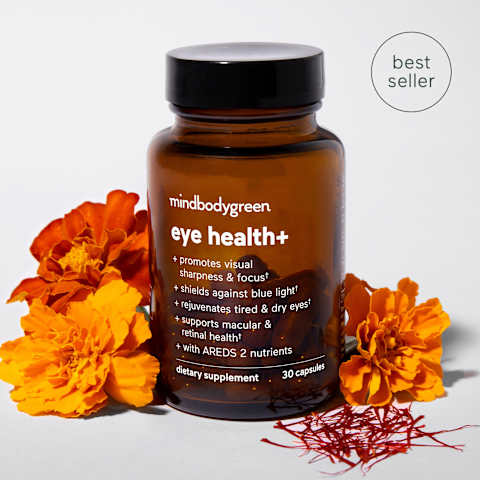Advertisement
Blue Light Exposure Seriously Affects Your Eye Longevity, New Study Reveals


When you hear about blue light health concerns, you probably think of how it affects the circadian rhythm and your sleep health. Or, perhaps, your mind goes straight to the blue-light-blocking glasses you've likely seen advertised on social media.
Thanks to the constant use of digital technology and LED lights (not to mention the biggest blue light source we have to worry about—the sun), we're being barraged by blue light from every angle imaginable.
According to a new study published by Nature Partner Journals Aging1, this long-term exposure to blue light might be seriously affecting whole-body health and longevity.
The blue light study design.
Led by biological clocks (i.e., circadian rhythm) expert and professor Jadwiga Giebultowicz, Ph.D., researchers at Oregon State University investigated how blue light exposure affects neurological (brain) health, mitochondrial health, and overall longevity by exposing the common fruit fly (Drosophila melanogaster) to blue light as they age.
In general, aging reduced the organisms' tolerance for environmental stressors (such as blue light), partly due to decreased mitochondrial reactions. The flies' mitochondrial health was evaluated at different points of their life span (i.e., two, 20, 40, and 60 days) to see how exactly blue light affected their cellular health as they aged.
"At the crux of mitochondrial health is bioenergetics, aka cellular energy production (you know, ATP from the foods we eat), for every function in our cells, tissues, organs, and whole-body systems," shares nutrition scientist Ashley Jordan Ferira, Ph.D., RDN.
How blue light affects longevity.
Although we often think of blue light affecting our eye health—and it certainly does—it seems there may be more than meets the eye with blue light longevity concerns (see what I did there?).
Case in point: A previous Nature Partner Journals Aging 2019 study2 also led by Giebultowicz revealed that long-term exposure to blue light affected both retinal and non-retinal cell longevity in common fruit flies, affecting everything from vision health to neurocognitive factors and locomotor function.
In this newer study, the effects of blue light exposure increased significantly later in the life span—i.e., older flies were far more susceptible to the same intensity and duration of blue light than younger flies. Again, this is partially due to the natural decrease in mitochondrial efficiency and partially due to the impact of blue light as a stressor.
Though these study results are from a preclinical insect model (albeit a "stellar organism specifically for circadian rhythm research," explains Ferira), they demonstrate that blue light can have a profound impact on the eye health, cognitive function, movement, and overall longevity of organisms—especially later in life.
The takeaway.
Too much of anything isn't good for our health, and long-term blue light exposure, thanks to excessive use of screens and LED lights, is no exception. Luckily, there are a few ways we can protect ourselves from blue light on a daily basis—such as a comprehensive vision longevity supplement like mbg's eye health+.*
With clinically backed doses of vision-essential macular carotenoids lutein and zeaxanthin, eye health+ acts like a pair of "internal sunglasses," protecting your eyes from long-term blue light exposure.* Additional ingredients including astaxanthin, maqui berry, vitamin C and E, zinc, and copper round out the vegan formula to support eye hydration, combat eye fatigue, and promote vision longevity.*
We simply can't avoid blue light in our day-to-day lives (not without running away to a remote cabin in the woods, at least). But we can take daily, proactive measures to protect our eye health and visual performance! And eye health+ is a great way to do just that.*
